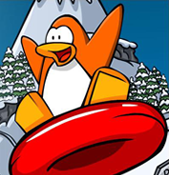
Earlier this month, without my foreknowledge or co-operation, my children's home was sold to a major American corporation. Fortunately, it was easy to save their memorabilia and furnishings, because this house is online.
Technically, it's an igloo, and a virtual one to boot, called Club Penguin. My two kids, aged 10 and seven, have been going there for one year. Initially, I wasn't so keen because our new computer was not meant to be their compelling time-waster, but mine. But I've succumbed, and apparently so have some other parents -- as of today, there are 12 million users on the site.
Club Penguin is like a cuddly, G-rated, product-placement-free Second Life. Every kid who signs up at Club Penguin obtains a user ID, a penguin avatar and a small igloo to call home. They log on to play video games, exchange instant messages with other penguins, or simply waddle about the club's ever-expanding cartoony grounds.
All of this entertainment is basically free, unless players wish to convert the points earned from gaming into furniture and other treasures that they can display in their igloos. Then the penguin requires a nearby adult with a credit card ($6 per month or $60 per year). Evidently, it is a pretty common wish, as evidenced by the fact that Disney just laid out $350 million to acquire the site; double if certain business targets are met.
But much less common is the knowledge that Club Penguin is a B.C. company, started in Kelowna in October 2005. While in Kelowna some weeks ago, I was able to beg my way in for a look-see and chat with its spokesperson, Karen Mason. On behalf of the canny Tyee reader, I did try to ask the hard, skeptical questions, while not wanting them to take away the Club Penguin stickers and toys that I'd managed to grab.
'Hi there, fellow penguin'
After touring their tasteful, though not overly large Kelowna offices, Mason told me that Club Penguin was started by Lane Merrifield, Dave Krysko and Lance Priebe, who merely wanted to build their young kids and grandkids a safe place to entertain themselves online.
This raises the question of why kids actually need online play. The short answer is because they like that stuff already, as evidenced by competing sites like Neopets and Webkinz.
Club Penguin offers its novice chatters multiple layers of predator-proofing, the first being that it's difficult to have long conversations. Penguins tend not to hang around together; occasionally they will say things like "hi" and "who knows today's secret item?"
Second, every utterance is monitored. When a user types something from the registry of forbidden words (curses and other problematic language), a filter automatically blocks the message and flags a moderator, who will review the conversation and issue a repercussion, if warranted. Club Penguin also has the benefit of learning from Toddington and Co., a Vancouver firm that trains police forces about Internet safety.
Third, and perhaps a little disturbingly, users are encouraged to report sexual or generally disrespectful comments. This raises the image of Ceceascu-esque spies, but Mason suggests I think of it more as a neighbourhood block watch. "Kids are encouraged to be stewards of the world, to take responsibility for a place that has no racism, unfairness or bullying."
'Training wheels'
It sounds rather idealistic, but Club Penguin isn't everyone's idea of a utopia. It could be seen as an incubator of materialism, where the object is to show off possessions. Mason defends the emphasis on cute furnishings as being a practical lesson in value. "If my son has to save up credits to buy the big screen TV for his igloo, then he learns that he can't buy something else. It's training wheels for real life."
But Club Penguin isn't entirely without civilizing effects. A percentage of company profits go towards children's charities. Within the game itself, users can choose to co-operate on projects. One part of the game world, a lighthouse, was designed to be a heritage restoration. In order to complete the level, kids had to donate their credits. Another laudable aspect is the tour guide program. The moderators noticed that some of the penguins were offering to show new players around the playing areas; eventually, this became a formal process where guides could register.
A local company that has attracted massive investment in the province? A program that teaches altruism? A game that elicits spontaneous volunteerism? They had me at "teaches kids to want an attractive bedroom." Now, if they only had a game to teach them to take their dishes to the sink....
Related Tyee stories:
- Are Computer Games Rebooting Our Minds?
The hot debate moves to a big conference in Vancouver. - We're Raising Gamblers
Glamour, tech feed betting habits of BC's kids. - Building Heart Fiber in Kids
Teaching children about giving pays off.















Tyee Commenting Guidelines
Comments that violate guidelines risk being deleted, and violations may result in a temporary or permanent user ban. Maintain the spirit of good conversation to stay in the discussion.
*Please note The Tyee is not a forum for spreading misinformation about COVID-19, denying its existence or minimizing its risk to public health.
Do:
Do not: